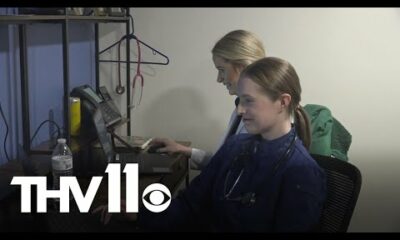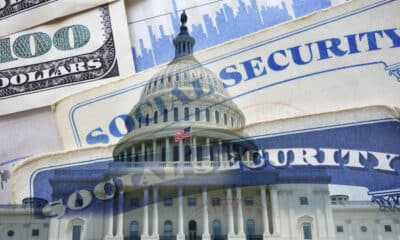Mississippi Today
UMMC awarded $1 million to fight sky-high syphilis rates

The state’s largest public hospital will accept $1 million from the federal government this month to reduce Mississippi’s syphilis rates – among the highest in the nation.
Mississippi ranks sixth in the nation for its rate of syphilis and fourth in the nation for its rate of congenital syphilis, which occurs when a mother passes the infection to her infant in utero.
Rates in Mississippi have risen rapidly in the most recent years for which data is available.
“It’s a nationwide problem but it’s especially problematic here,” Dr. Thomas Dobbs, dean of the John D. Bower School of Population Health at the University of Mississippi Medical Center, said in a press release. “And our numbers might be higher since the detection and reporting of STIs (sexually transmitted infections) were significantly less during the pandemic years.”
UMMC, the state’s only academic medical center, will use the grant to launch a year-long initiative to increase syphilis awareness, testing and treatment, according to the press release, with a focus on preventing the disease during pregnancy.
Along with declining condom use and decreased screening during the pandemic, access to care is a leading cause of the continued spike, Dobbs said.

In Mississippi, the poorest state boasting some of the worst health metrics in the country, access to care is a pervasive issue – in terms of provider shortages and uninsured people.
More than half of Mississippi counties are considered maternity care deserts, meaning they have no hospitals providing obstetric care, no OB-GYNs and no certified nurse midwives. Even when care is available, it’s not always affordable. Tens of thousands of working-class Mississippians fall into the health care “coverage gap” – making too much to qualify for Medicaid under the state’s current eligibility restrictions, but too little to afford private insurance from the marketplace.
Mississippi is one of only 10 states not to expand Medicaid in the decade since the Affordable Care Act made it an option for states. A bill to change that died in the Legislature this year after a saga of partisan politics.
The teaching hospital will partner with clinics and community-based organizations to enhance diagnosis and treatment of the disease. It will also partner with the State Health Department to ensure completion of treatment for patients and partner tracing.
“Syphilis cases are increasing across the board in the state,” said Dr. Victor Sutton, chief of community health and clinical services at the Mississippi State Department of Health, in the press release. “MSDH is looking forward to working with the University of Mississippi Medical Center’s John D. Bower School of Population Health to end this threat to public health. We have a Syphilis Task Force in place that will spearhead data collection and educate providers and the community while also ensuring proper testing and treatment of individuals.”
When treated early on in pregnancy, mothers can prevent passing the infection to their baby with a simple round of antibiotics. Up to 40% of infants born to a mother whose syphilis went untreated will die.
The State Board of Health passed an emergency order requiring physicians to test all pregnant women for syphilis in 2023, and the order is still in effect.
Part of the new initiative afforded by the grant will be aimed at increasing testing – even outside of pregnancy, explained Dobbs.
“Our emergency room physicians have been on the cutting edge of this sort of preventive health work in ERs for a while, especially with HIV and Hepatitis C,” Dobbs, the former State Health Officer, said in the press release. “Promoting universal syphilis screening in ERs has been a big conversation nationally within professional associations.”
This article first appeared on Mississippi Today and is republished here under a Creative Commons license.![]()
Mississippi Today
On this day in 1997


Dec. 22, 1997

The Mississippi Supreme Court upheld the conviction of white supremacist Byron De La Beckwith for the 1963 murder of Medgar Evers.
In the court’s 4–2 decision, Justice Mike Mills praised efforts “to squeeze justice out of the harm caused by a furtive explosion which erupted from dark bushes on a June night in Jackson, Mississippi.”
He wrote that Beckwith’s constitutional right to a speedy trial had not been denied. His “complicity with the Sovereignty Commission’s involvement in the prior trials contributed to the delay.”
The decision did more than ensure that Beckwith would stay behind bars. The conviction helped clear the way for other prosecutions of unpunished killings from the Civil Rights Era.
This article first appeared on Mississippi Today and is republished here under a Creative Commons license.![]()
Mississippi Today
Medicaid expansion tracker approaches $1 billion loss for Mississippi

About the time people ring in the new year next week, the digital tracker on Mississippi Today’s homepage tabulating the amount of money the state is losing by not expanding Medicaid will hit $1 billion.
The state has lost $1 billion not since the start of the quickly departing 2024 but since the beginning of the state’s fiscal year on July 1.
Some who oppose Medicaid expansion say the digital tracker is flawed.
During an October news conference, when state Auditor Shad White unveiled details of his $2 million study seeking ways to cut state government spending, he said he did not look at Medicaid expansion as a method to save money or grow state revenue.
“I think that (Mississippi Today) calculator is wrong,” White said. “… I don’t think that takes into account how many people are going to be moved off the federal health care exchange where their health care is paid for fully by the federal government and moved onto Medicaid.”
White is not the only Mississippi politician who has expressed concern that if Medicaid expansion were enacted, thousands of people would lose their insurance on the exchange and be forced to enroll in Medicaid for health care coverage.
Mississippi Today’s projections used for the tracker are based on studies conducted by the Institutions of Higher Learning University Research Center. Granted, there are a lot of variables in the study that are inexact. It is impossible to say, for example, how many people will get sick and need health care, thus increasing the cost of Medicaid expansion. But is reasonable that the projections of the University Research Center are in the ballpark of being accurate and close to other studies conducted by health care experts.
White and others are correct that Mississippi Today’s calculator does not take into account money flowing into the state for people covered on the health care exchange. But that money does not go to the state; it goes to insurance companies that, granted, use that money to reimburse Mississippians for providing health care. But at least a portion of the money goes to out-of-state insurance companies as profits.
Both Medicaid expansion and the health care exchange are part of the Affordable Care Act. Under Medicaid expansion people earning up to $20,120 annually can sign up for Medicaid and the federal government will pay the bulk of the cost. Mississippi is one of 10 states that have not opted into Medicaid expansion.
People making more than $14,580 annually can garner private insurance through the health insurance exchanges, and people below certain income levels can receive help from the federal government in paying for that coverage.
During the COVID-19 pandemic, legislation championed and signed into law by President Joe Biden significantly increased the federal subsidies provided to people receiving insurance on the exchange. Those increased subsidies led to many Mississippians — desperate for health care — turning to the exchange for help.
White, state Insurance Commissioner Mike Chaney, Gov. Tate Reeves and others have expressed concern that those people would lose their private health insurance and be forced to sign up for Medicaid if lawmakers vote to expand Medicaid.
They are correct.
But they do not mention that the enhanced benefits authored by the Biden administration are scheduled to expire in December 2025 unless they are reenacted by Congress. The incoming Donald Trump administration has given no indication it will continue the enhanced subsidies.
As a matter of fact, the Trump administration, led by billionaire Elon Musk, is looking for ways to cut federal spending.
Some have speculated that Medicaid expansion also could be on Musk’s chopping block.
That is possible. But remember congressional action is required to continue the enhanced subsidies. On the flip side, congressional action would most likely be required to end or cut Medicaid expansion.
Would the multiple U.S. senators and House members in the red states that have expanded Medicaid vote to end a program that is providing health care to thousands of their constituents?
If Congress does not continue Biden’s enhanced subsidies, the rates for Mississippians on the exchange will increase on average about $500 per year, according to a study by KFF, a national health advocacy nonprofit. If that occurs, it is likely that many of the 280,000 Mississippians on the exchange will drop their coverage.
The result will be that Mississippi’s rate of uninsured — already one of the highest in the nation – will rise further, putting additional pressure on hospitals and other providers who will be treating patients who have no ability to pay.
In the meantime, the Mississippi Today counter that tracks the amount of money Mississippi is losing by not expanding Medicaid keeps ticking up.
This article first appeared on Mississippi Today and is republished here under a Creative Commons license.![]()
Mississippi Today
On this day in 1911


Dec. 21, 1911

Josh Gibson, the Negro League’s “Home Run King,” was born in Buena Vista, Georgia.
When the family’s farm suffered, they moved to Pittsburgh, and Gibson tried baseball at age 16. He eventually played for a semi-pro team in Pittsburgh and became known for his towering home runs.
He was watching the Homestead Grays play on July 25, 1930, when the catcher injured his hand. Team members called for Gibson, sitting in the stands, to join them. He was such a talented catcher that base runners were more reluctant to steal. He hit the baseball so hard and so far (580 feet once at Yankee Stadium) that he became the second-highest paid player in the Negro Leagues behind Satchel Paige, with both of them entering the National Baseball Hame of Fame.
The Hall estimated that Gibson hit nearly 800 homers in his 17-year career and had a lifetime batting average of .359. Gibson was portrayed in the 1996 TV movie, “Soul of the Game,” by Mykelti Williamson. Blair Underwood played Jackie Robinson, Delroy Lindo portrayed Satchel Paige, and Harvey Williams played “Cat” Mays, the father of the legendary Willie Mays.
Gibson has now been honored with a statue outside the Washington Nationals’ ballpark.
This article first appeared on Mississippi Today and is republished here under a Creative Commons license.![]()
-

 News from the South - Arkansas News Feed6 days ago
News from the South - Arkansas News Feed6 days agoFaith-inspired ministry opens health clinic in Little Rock
-

 News from the South - Florida News Feed5 days ago
News from the South - Florida News Feed5 days ago‘Dirty Dancing,’ ‘Beverly Hills Cop,’ ‘Up in Smoke’ among movies entering the National Film Registry
-

 Our Mississippi Home5 days ago
Our Mississippi Home5 days agoThe Meaning of the Redbird During the Holiday Season
-

 Mississippi Today4 days ago
Mississippi Today4 days agoMississippi PERS Board endorses plan decreasing pension benefits for new hires
-

 Local News1 day ago
Local News1 day agoHard Rock Hotel & Casino Biloxi Honors Veterans with Wreath-Laying Ceremony and Holiday Giving Initiative
-

 News from the South - Missouri News Feed2 days ago
News from the South - Missouri News Feed2 days agoCould prime Albert Pujols fetch $1 billion in today's MLB free agency?
-

 News from the South - North Carolina News Feed1 day ago
News from the South - North Carolina News Feed1 day agoSocial Security benefits boosted for millions in bill headed to Biden’s desk • NC Newsline
-

 Mississippi Today6 days ago
Mississippi Today6 days agoOn this day in 1976






























